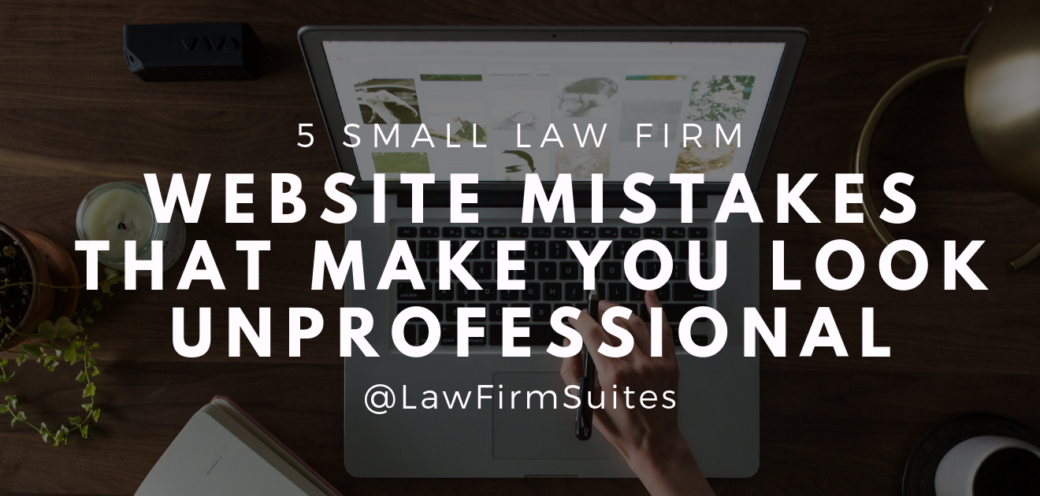Check out these small law firm website mistakes to make sure you can fix or avoid them altogether!
Whether you’re in the process of creating your firm’s first website or perfecting a current one, it’s not a task you should take lightly. In fact, G2Crowd’s 2019 Small Business Statistics reports that 83% of small business owners with a website feel a competitive advantage to those without one.
Your website is probably the most important marketing asset at your disposal. It needs to do so many different things, and do them well, such as brand your firm, educate potential clients, help your firm to rise to the top of search engine rankings, funnel for your potential clients into paying clients, collect leads, and so much more.
That’s why it’s so important to not only have a website, but one that is free of the common mistakes that will hold your firm back. Check out these small law firm website mistakes to make sure you can fix or avoid them altogether!
1. Starting Without a Plan
Not having a strategy or plan for your firm’s website is probably the first mistake you can make when it comes to developing your online presence. A website plan should allow you to define goals, audiences, content, forms and then measure everything as well. It should answer the following questions:
- Who is your ideal client?
- What websites do your ideal clients already visit?
- What is your website’s goal or goals?
- Will your site need certain functionality?
- Which information do you need/want to give website visitors?
- What types of content will you provide? Blogs? Social posts? eBooks? Videos?
- How will you convey your personal brand as a lawyer through content and branding?
- What KPI’s will you track and record to measure success and growth?
Defining a website strategy will help you not only balance having a beautiful site, but accomplish something for your business, too!
2. Outsourcing Everything
Many solo and small firm lawyers think it’s best to outsource web development tasks to expensive agencies or contractors. While it’s helpful to have some tasks outsourced, it might not be the best idea for your website to be one of them.
Outsourcing your website makes it difficult to make changes when and where you want. You have to go through multiple people, or even wait weeks at a time to get a small website tweak made. Imagine having to go through 3 different people and wait 2 weeks just to get your address or phone number changed, and then getting a bill on top of it!
When you outsource and have no control over your OWN site, it results in added cost, time, and headaches.
3. You Don’t Consider Mobile Users
Here’s a fast fact: while 30% of all website traffic comes from a handheld device like a mobile phone or tablet, 90% of small business websites don’t design for these devices’ screen sizes.
Also, Google now uses mobile-friendliness as part of its ranking system. So if your site is not mobile-friendly you will rank lower in search results.
Also, failing to have a mobile-friendly site can cause you to lose lots of potential business since over half of internet searches are done on mobile devices.
If you have a WordPress site there are plugins that will make your site mobile friendly. These are simple to use, just install the plugin and it will do all the work for you.
4. Forgetting to Consider SEO
Having an online presence supported by organic search, or SEO, is invaluable.
Nearly 60% of consumers use search engines to find products they want to buy. These statistics do not only apply to products like nail polish or power tools. Consumers are looking for lawyers online too.
Most of your future clients will be researching legal services online before they pick up the phone to schedule a consultation. Luckily, you can use SEO to make sure prospects are finding your website in online searches before they discover your competitors’.
The bottom line is that if your law firm isn’t showing up in online searches, then you’re missing out on new business. Getting on the first page of a search may seem impossible, but that’ is where local search comes into play.
To make sure that your website is being found on Google and other search engines, you need to implement basic SEO on your website. Here are a few tips to improve your firm’s search rank:
- Create longer and larger pages. Google likes long and informative content, so the more words, the better.
- Use a keyword tool to find a keyword that is searched for a lot. First, focus on optimizing each page of your site with one primary keyword on each page. Then, use it on other elements within your site like Atl Text on images, the Meta description and URL:
- Check for page load times. Check your websites load times. Large files and poorly designed templates can slow down your site and Google doesn’t like slow websites!
5. Not Updating Your Website
Nobody wants to have a dated and old looking website. Well, Google doesn’t want you to have an old site too, and they will actually punish your search rank for doing so.
Instead, you should consistently refresh your website based on how it’s performing. Look at your web analytics (such as Google Analytics or Hubspot reporting tools). If you have a page with low traffic, for instance, you can think of ways to link from other pages to it to rev up the volume of visits.
An easy way to keep your site fresh and to appease the Google SEO gods is to regularly publish articles to a blog. This is a super simple way to create new content to update your site and stack up both internal and external links (which is another thing that will help your SEO rank).


